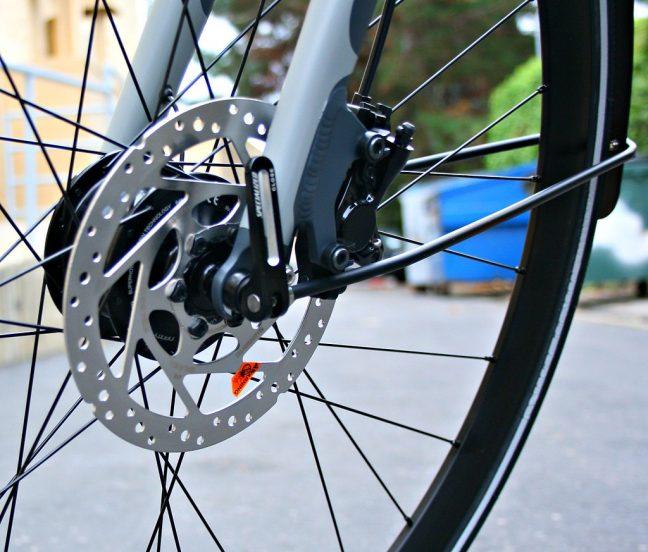Is your bike so rusted it hurts your legs to pedal? Have you ever had to slow your bike by dragging your feet on the pavement like a kid because your brakes are worn out? A local Madison area bike shop may be able to solve all these problems and more without breaking the bank.
Madison Freewheel Bicycle Company, located on South Park Street, is a community-focused bicycle workshop that aims to serve the Madison community by providing bike parts and repair services as well as bike building and maintenance classes at very affordable rates.
“We have grown and matured into a charity that helps people get the free people-powered, carbon-neutral transportation that they need,” Freewheel Bike Shop Co-Director Lang Schmitt said.
BCycle electric bike launch makes Madison first city with fully-electric bike share fleet
The workshop began in 2003 and has since given away 12,000 bikes, taught 5,000 students, saved 800 tons of bike parts from landfills and expanded to two different locations. Freewheel is even planning on funding a third location near the Capitol building. They are halfway to their goal of $100,000, so if you are feeling generous, head over to their GoFundMe page.
The Freewheel Bike Shop is a huge resource for cyclists who often find themselves pressed for cash, as the hobby of cycling can often present a large financial burden. Community bike shops like Freewheel, however, are working to close this gap while connecting more people to the hobby.
“It’s definitely hard when you see it going in that a bike is actually pretty expensive sometimes and it can be off-putting for sure,” University of Wisconsin junior and avid cyclist Conor Villarreal said. “I think that service is really great to get people into [cycling] … It can be an expensive hobby if you just look at it upfront. You don’t need to have money to get into it, but it’s definitely a barrier to a lot of people.”
Schmitt and the other members of Freewheel also recognize this monetary barrier between cyclists and their hobby, which is why they have devoted their efforts toward eliminating the high cost of cycling.
“I think that a lot of people who start investigating what we do are kind of surprised to find out that the services and bicycles that we provide to people are free … We don’t do means testing either,” Schmitt said. “A lot of charities will ask you to basically prove that you’re poor. We find that that’s kind of demeaning, and it gets in the way of our mission of free bicycles for every human.”
Nicholas Recreation Center finally opens doors to students after long wait
Aside from an enjoyable hobby, bicycles can offer a practical means of transportation. In a city as big as Madison, parking spots for cars sell at a premium, which is why many take to biking as a cheaper and easier means of transportation. Madison.com estimates that nearly five percent of Wisconsinites are regular bicycle commuters to and from their place of work.
“There’s just so many different ways that you can really utilize a bike,” Villarreal said. “You can get groceries, I definitely know people who commute to work every day, it’s just really versatile … almost as a replacement for a car.”
Madison is also ranked No. 2 in the list of most bicycle-friendly cities in the U.S., behind only San Luis Obispo, California.
“In the United States, so much of our infrastructure is built for cars,” Schmitt said. “Walking is often not an option for people to perform basic errands.”
Schmitt also described that cycling can often present a racial barrier, as the typical cycler in the U.S. today is not part of a diverse demographic. Part of Freewheel’s mission involves diversifying the bicycle space, making it an accessible hobby for people of all walks of life.
“Most people who bicycle in the United States are white, they are male, they are on the older side often and they are affluent and that often tends to be a barrier to people who don’t meet those demographics,” Schmitt said. “We’ve definitely aimed a lot of our activism and our outreach in terms of bringing in people who might not otherwise feel welcome at a bike shop into our community and into the bicycle space.”
Student journalist so committed, hit by bike while conducting interview
At the end of the day, cycling is all about empowering people to feel free to do whatever they please.
“For me I think it feels like I can go wherever and it’s almost a freedom in a sense where there are places I can go see,” Villarreal said. “With the hundreds of miles of trails in Madison, there are places you might not see otherwise.”
Freewheel’s latest project is a collaboration with the city of Madison to create the Madison Bicycle Center. The building is another space for cyclists to visit which aims to eliminate barriers between downtown bike commuters, and provides resources like showers and changing rooms.
The center is not currently open for full use due to COVID-19, but some repair facilities are in operation, boasting some of the fastest turnaround times in the city.














